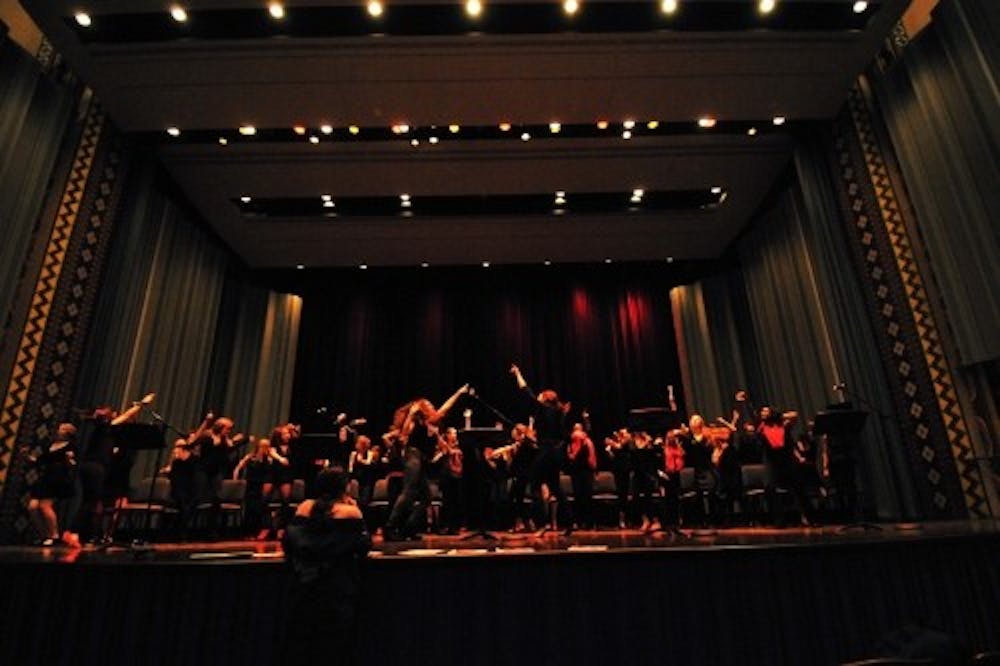“At first, women were reluctant to talk. They were a little shy. But once you got them going, you couldn’t stop them. Women secretly love to talk about their vaginas, mainly because no one has asked them before.”
For Sophia Griffith–Gorgati (C ’18), a former Street staffer and director of Penn’s production of The Vagina Monologues (VagMons), the show’s opening lines explain why she has been involved since she was a freshman. She realizes that while not all women have vaginas, most women consider their vagina to be central to their womanhood, and that this performance serves as a catalyst for sparking these conversations on Penn’s campus.
On February 16 and 17, members of the V–Day University of Pennsylvania College Campaign will put on their 18th annual production of The Vagina Monologues. Each year, the performance raises approximately $20,000 to benefit Philadelphia’s local rape crisis center, Women Organized Against Rape.
Since the play was originally conceived by playwright Eve Ensler in 1996, its purpose has shifted from “a celebration of the vagina” to the impetus of a national feminist movement to stop sexual violence against all people with vaginas.
Universities across the country participate annually. This year will mark the 18th season of The Vagina Monologues put on by V–Day UPenn. The performance takes viewers on a whirlwind of a journey through narratives of consensual and nonconsensual sexual experiences from a range of varying perspectives.
Current producer Ariana Martino (C ’18) had no idea what to expect when first attending the show her freshman year. “I wasn’t expecting the stories to be sad, or graphic, or serious as well as funny and relatable. I wasn’t expecting how personal the stories were going to feel. It feels like you’re talking to the person that experienced it,” she said.
Though widely regarded as a radical and empowering work of feminist performance art, students at Penn and elsewhere have expressed disappointment in the lack of monologues coming from transgender perspectives. Some have criticized the show’s title, which may feel exclusionary for audience members without vaginas.
Members of the V–Day board understand and agree with these claims. “It is a dated production, so it’s a flawed production in many ways. We have, over the years, made a very conscious effort to make sure that we aren’t just presenting this movement from the perspective of cisgender women,” said Ariana.
These concerns have caused some schools, including Mount Holyoke University, to cancel VagMons altogether. However, performers, board members, and supporters on Penn’s campus are unanimous in the view that the show should go on while acknowledging criticisms.
Sophia believes strongly that Penn should continue to stage the production. “I think it’s so important to problematize the show and think about the ways in which it’s not including everyone, but I’m really glad that, despite that, we continue to put the show on,” she said. She worries that stopping the production at Penn would minimize dialogue on the subject and detract from the intention of the program as a whole.
“I think it’s important to remember that the show is not about womanhood, nor is it meant to encompass the entire experience of women. This is one production and it can never hope to encompass the experiences of all people, as no work of art should ever be expected to do,” she said.
In preparation for this year’s production, the board has spent extensive time discussing ways to make the show more inclusive. In addition to including a monologue told from the perspective of a trans woman called “They Beat the Girl Out of My Boy,” this year’s production will feature local Philadelphia activist, author, and trans woman Marissa McCool as the keynote speaker. She will be performing a piece titled “Ode to the Blocked,” a poetic saga about all of the people she has blocked on social media.
Emilia Hinckley (C ’18) has participated in the V–Day Movement for the past few years, but this season will be her first as a cast member. “It is intimidating to do something that is pretty outside of my comfort zone, but I think that’s what’s really nice about VagMons. It’s about getting a really diverse range of women together to talk about these sorts of issues.”
Board members and cast members alike appear to be in high spirits as opening night for The Vagina Monologues approaches. According to Ariana, ticket sales are going strong. All indications point to another positive reception of the play by the Penn community.
Buy tickets for the Vagina Monologues here.
Located at the Irvine Theater
February 16 and 17, 2018
An earlier version of this article stated that Ariana Martino was the director of V–Day UPenn instead of the producer. 34th Street regrets this error.

